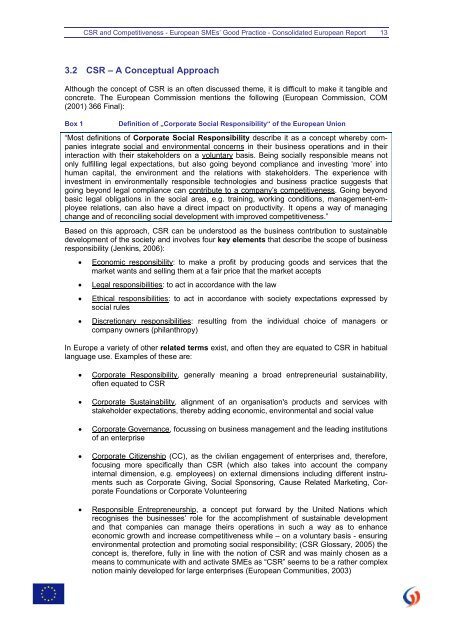CSR and Competitiveness European SMEs - KMU Forschung Austria
CSR and Competitiveness European SMEs - KMU Forschung Austria
CSR and Competitiveness European SMEs - KMU Forschung Austria
You also want an ePaper? Increase the reach of your titles
YUMPU automatically turns print PDFs into web optimized ePapers that Google loves.
<strong>CSR</strong> <strong>and</strong> <strong>Competitiveness</strong> - <strong>European</strong> <strong>SMEs</strong>’ Good Practice - Consolidated <strong>European</strong> Report 13<br />
3.2 <strong>CSR</strong> – A Conceptual Approach<br />
Although the concept of <strong>CSR</strong> is an often discussed theme, it is difficult to make it tangible <strong>and</strong><br />
concrete. The <strong>European</strong> Commission mentions the following (<strong>European</strong> Commission, COM<br />
(2001) 366 Final):<br />
Box 1 Definition of „Corporate Social Responsibility“ of the <strong>European</strong> Union<br />
“Most definitions of Corporate Social Responsibility describe it as a concept whereby companies<br />
integrate social <strong>and</strong> environmental concerns in their business operations <strong>and</strong> in their<br />
interaction with their stakeholders on a voluntary basis. Being socially responsible means not<br />
only fulfilling legal expectations, but also going beyond compliance <strong>and</strong> investing ‘more’ into<br />
human capital, the environment <strong>and</strong> the relations with stakeholders. The experience with<br />
investment in environmentally responsible technologies <strong>and</strong> business practice suggests that<br />
going beyond legal compliance can contribute to a company’s competitiveness. Going beyond<br />
basic legal obligations in the social area, e.g. training, working conditions, management-employee<br />
relations, can also have a direct impact on productivity. It opens a way of managing<br />
change <strong>and</strong> of reconciling social development with improved competitiveness.”<br />
Based on this approach, <strong>CSR</strong> can be understood as the business contribution to sustainable<br />
development of the society <strong>and</strong> involves four key elements that describe the scope of business<br />
responsibility (Jenkins, 2006):<br />
• Economic responsibility: to make a profit by producing goods <strong>and</strong> services that the<br />
market wants <strong>and</strong> selling them at a fair price that the market accepts<br />
• Legal responsibilities: to act in accordance with the law<br />
• Ethical responsibilities: to act in accordance with society expectations expressed by<br />
social rules<br />
• Discretionary responsibilities: resulting from the individual choice of managers or<br />
company owners (philanthropy)<br />
In Europe a variety of other related terms exist, <strong>and</strong> often they are equated to <strong>CSR</strong> in habitual<br />
language use. Examples of these are:<br />
• Corporate Responsibility, generally meaning a broad entrepreneurial sustainability,<br />
often equated to <strong>CSR</strong><br />
• Corporate Sustainability, alignment of an organisation's products <strong>and</strong> services with<br />
stakeholder expectations, thereby adding economic, environmental <strong>and</strong> social value<br />
• Corporate Governance, focussing on business management <strong>and</strong> the leading institutions<br />
of an enterprise<br />
• Corporate Citizenship (CC), as the civilian engagement of enterprises <strong>and</strong>, therefore,<br />
focusing more specifically than <strong>CSR</strong> (which also takes into account the company<br />
internal dimension, e.g. employees) on external dimensions including different instruments<br />
such as Corporate Giving, Social Sponsoring, Cause Related Marketing, Corporate<br />
Foundations or Corporate Volunteering<br />
• Responsible Entrepreneurship, a concept put forward by the United Nations which<br />
recognises the businesses’ role for the accomplishment of sustainable development<br />
<strong>and</strong> that companies can manage theirs operations in such a way as to enhance<br />
economic growth <strong>and</strong> increase competitiveness while – on a voluntary basis - ensuring<br />
environmental protection <strong>and</strong> promoting social responsibility; (<strong>CSR</strong> Glossary, 2005) the<br />
concept is, therefore, fully in line with the notion of <strong>CSR</strong> <strong>and</strong> was mainly chosen as a<br />
means to communicate with <strong>and</strong> activate <strong>SMEs</strong> as “<strong>CSR</strong>” seems to be a rather complex<br />
notion mainly developed for large enterprises (<strong>European</strong> Communities, 2003)




